Serhii Deineko, Head of Ukraine's State Border Guard Service, on texting Zelenskyy at 05:17, telling a Russian warship to go f**k itself, and the Monaco Battalion
Serhii Deineko knows what war is and what occupation is. In 2014, the incumbent head of the State Border Guard Service of Ukraine was in charge of the Luhansk Border Guard Detachment, which took on Russian terrorist forces in June.
Subsequently, the border guards had to retreat, and part of Luhansk Oblast close to Deineko remained under occupation for years.
It was the soldiers of the Luhansk Border Guard Detachment who were the first to meet the full-scale Russian invasion on 24 February last year.
It was through Ukrainian border guards that the first symbol of this war appeared: the direction that the "Russian warship" was instructed to go towards.
And this interview with Serhii Deineko is also the first one since the beginning of the full-scale invasion.
He told Ukrainska Pravda (UP) how the war began, whether to expect an attack from Belarus, and when Luhansk will be free again.
"I sent an SMS to Zelenskyy personally at 5:17, saying that the invasion was underway"
We are meeting on the eve of the anniversary of the full-scale invasion. There was a lot of information about how Western intelligence warned about such Russian plans. The border guards had their data and had to react to these signals. How did you prepare for the Russian offensive in February 2022?
Yes, Western intelligence warned us. And we were attentive to this information. We have our own border intelligence, which works very effectively, especially in our neighbouring countries: the Russian Federation and its satellite, Belarus.
We knew about the planned invasion. Of course, now there is a lot of information that "everyone knew" and "everyone was preparing". However, the Border Guard Service informed the highest military leadership of the state. I reported to the president two weeks before the full-scale invasion that there would be a war, that Russia would certainly attack the territory of Ukraine from the Republic of Belarus through the Chornobyl zone.
We had this information, and for a long time, we had full control over certain representatives of the military and political leadership of the Russian Federation. We had video footage, photos, we knew the plan in detail. Therefore, this allowed us to prepare well.
Two weeks before the start of the full-scale invasion, we completely evacuated all secret documentation of personal and housing files of our staff from Mariupol, Kramatorsk, Lysychansk, Kharkiv, Sumy, Chernihiv, Zhytomyr…
...Kherson?
I'll mention Kherson.
So also from Lutsk, Kyiv, Boryspil, Berdiansk, Odesa, and Kherson...
I hesitated and thought about whether to evacuate this documentation from the Crimean direction, because until the last moment, I did not believe that there could be an invasion from the Crimea.
We know Putin and his weakness for using "false flags," miners, and so on. We clearly understood that the invasion would come from Belarus, from the Chornobyl direction. We also clearly understood what would happen on the border of Kharkiv and Luhansk Oblasts, where the enemy would enter the territory of Ukraine to surround and eliminate our group in the Joint Forces Operation area [the area of Donetsk and Luhansk Oblasts under the control of Russian military forces and pro-Russian separatists – ed.].
Therefore, we responded as best we could with our combat reserves and have been moving our rapid response border guard commandant's offices.
However, to be honest, the Armed Forces did not reach us in time, just as they did not reach the border in 2014.
You said that you expected the Russians to attack from Chornobyl, but you did not expect them to enter from Crimea. It is clear that it was possible to attack from Donbas under false flags. But from Belarus?
From Donbas along the contact line, it was absolutely clear. From the territory of Belarus, they could attack not as a Russian army, but with the chevrons of Belarus, in Belarusian uniforms. And concerning the attack from Crimea, there are only Russians there, no one else. That's why I had my doubts about [them] entering from Crimea until the very end. Unfortunately, I was wrong.
On 21 February, I informed all the higher authorities in writing that there would be a war. Yes, the date of the full-scale offensive was postponed. First it was 19 February, then 22 February, and the last one was 24 February.
Do you understand why the date was postponed?
The enemy was waiting. They were on standby. We recorded that the Russian troops who were on the territory of Belarus for the so-called "exercises" started calling their relatives and actually saying goodbye to them as early as 12 February.
We intercepted these conversations, and it was clear from their contents and nature that the invasion was just days away.
Is that why you had a conversation with your Belarusian counterpart on the eve of the invasion?
On 19 February, on the president's command, I met with my counterpart at the border. I told him about our information and asked him to pass it on to self-proclaimed President Lukashenko, especially since he is also a border guard. Lukashenko served in the border troops of the USSR's KGB as a conscript. Therefore, he should have understood that border guards are supposed to prevent border violations, not organise and facilitate them.
My counterpart assured me that this was "definitely not possible". But by his reaction, I could tell that he was lying. It was our last meeting and our last conversation with him.
I gave him some materials to listen to and intercepted conversations of Russian soldiers. He turned pale, then red, then green, and promised that he would report to Lukashenko that evening. And then we saw what happened.
What helped us in Ukraine to keep the situation under control, especially in the first days, was the fact that the Ukrainian Armed Forces conducted drills in February, as opposed to the drills of the so-called union state of Belarus and Russia.
I had a conversation with Defence Minister Reznikov and Commander-in-Chief Zaluzhnyi. I am very glad that these drills were conducted, our military units were raised, deployed, and during the armed invasion of Russia, they were already able to resist and inflict fire damage.
Are you talking about the drills in Rivne Oblast, which the president visited?
The President was in Rivne, and we were with him on 17 February, exactly one week before the invasion. Before that, there were drills in Kherson. And then, on the same day, the president met with ambassadors. We were just in Mariupol at a military unit of the National Guard.
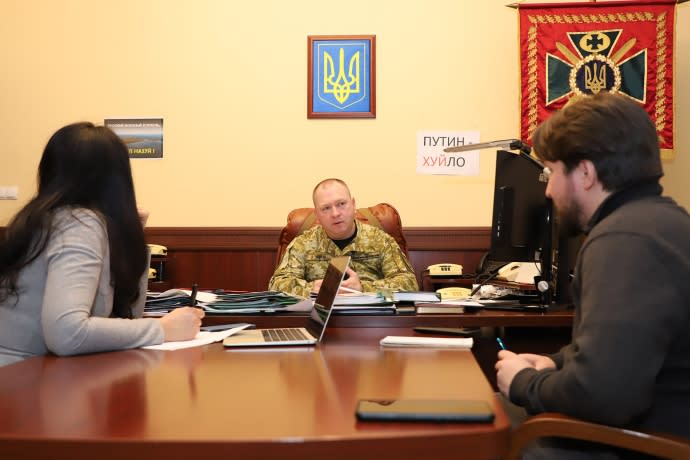
It was the border guards who first met the Russian invasion on 24 February. Can you remember how you informed the top political leadership that the invasion had begun?
Everyone thinks that the invasion started at 4 o'clock. This is not very correct.
The invasion began at 3:40, in the area of the Luhansk border guard detachment, in Milove district.
Is that the detachment that you headed in 2014?
Yes, that’s my detachment. [Stationed in] the village of Zorynivka. A Russian sabotage and reconnaissance group attacked a border checkpoint there, and a battle broke out. The first soldier to be killed in the full-scale aggression was killed there.
We received reports [from other units], and around four in the morning I reported to Denys Monastyrskyi, the Minister of Internal Affairs, that my men were fighting and columns [of Russian forces] were approaching. My understanding was that he reported to the president.
I sent a text message to Zelenskyy at 05:17, as the invasion was unfolding across most of the state border.
What was in that text?
You probably have a sense of why so many people did not take the threat of this war seriously. It’s because no one in their right mind could believe that such a war was possible in the centre of Europe in the 21st century. When a great power like the Russian Federation brutally attacks an entirely peaceful country like Ukraine, without any reason.
That missiles would be deployed, that thousands of tanks would enter the country, that peaceful cities would be shelled from the Russian territory using Grads [multiple-launch rocket systems - ed.] and other heavy weapons – who could believe that?
So what was in your text to the president?
Let me find it. I told him it was a full-scale invasion. Oh, here it is:
"Good morning, dear Mr President. Allow me to report. This is a full-scale military aggression on behalf of the Russian Federation. Several checkpoints on the border with Russia were shelled; rockets from Grads are being fired from their territory. Jet aircraft can be heard flying over the Chornobyl area. Grad rockets are also being fired from Crimea. There are five casualties so far. My units are taking positions."
That was at 05:17 in the morning. In effect, I reported that it was not a false-flag operation, but a full-scale invasion.
There is a lot of talk now about a possible offensive from Belarus. We are building fortifications. Are we prepared for an offensive from that side, if it does take place?
Let’s be honest: no fortifications can put a complete halt to enemy forces. They’ll be able to delay them and slow down the pace of their advance. That’s why they are being built. So that when enemy forces approach our fortifications and are forced to undertake a certain amount of work, we can strike them and disrupt their plans.
Considering what’s been done this year, we are far better prepared for a possible new offensive from the territory of Belarus, on any front.
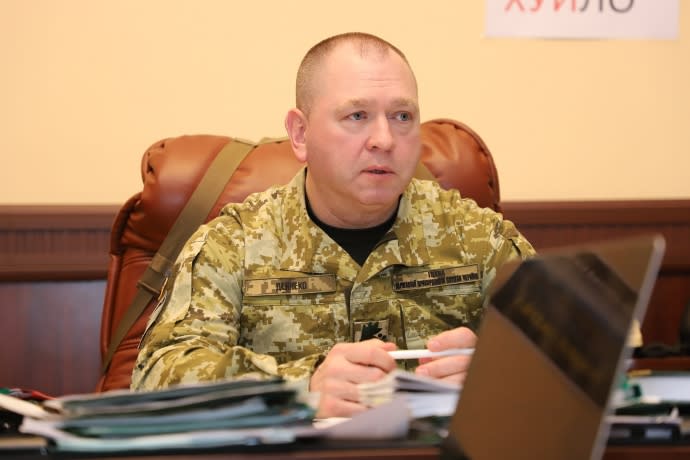
Do you personally believe that such an offensive will take place?
As of today, I see no threat from Belarus. If you ask me to guarantee that it won’t happen, I can’t do that. Because I don’t know what it will be like in two weeks’ time. If in the next two weeks, the situation develops and our intelligence does its job and obtains the enemy’s plans, maps, charts, and their idea about how to conduct an offensive, then I will have to make new conclusions and relate them to the military-political command.
But as of today, they don’t have sufficient forces there to successfully conduct an offensive operation in our country. If they try to enter from Belarus, then they will all remain lying there [dead], I have no doubt about that.
Could it be a decoy?
It could. All of their military exercises, aircraft exercises, are designed to demonstrate their presence so that we keep our reserve troops here, on the northern border instead of deploying them on the eastern front.
"I was sent the last photo of the Moskva ship before it sank"
Border guards became the heroes of resistance on the very first day [of the full-scale invasion]. I’m talking about the Zmiinyi (Snake) Island. One of your men uttered the famous phrase, which you also have displayed here. [There is a photograph of the Snake Island in Deineko’s office, which bears the inscription: "Russian military ship, go fuck yourself", which is what the Ukrainian border guards responded to the Russian proposal to surrender – ed.]
This photo has been here from day one. I told everyone that I’ll take it down on the day of our victory or I’ll let the person who might replace me in this position take it down, if they’re up to it.
At first people were saying that it was a marine who told Moskva to go to hell, even his name was circulated. Then it turned out it was a border guard. You didn’t offer any comments for a long time. Why is there so little clarity around this incident?
Look, the most important thing for me is a person’s life. I’ll start from your last question: Why has the hero’s name not been revealed? The thing is, there are still some security issues around this guy who might have done something quite brash.
I have an agreement with him: before these issues are resolved, I won’t do anything that would compromise his safety.
It was our radio wave and no representative of any other service could have used it to go live. So how Roman Hrybov got involved… When I saw that information on Facebook, we decided not to intervene at all at first. Then we saw that Hrybov was one of the people included in the first prisoner swap, and the whole saga with people being told that Hrybov was the hero began…
We even had to conduct an examination to prove that an entirely different person uttered that statement.
Did you ever get your hands on that famous recording?
Yes, the head of the regional command sent me the recording at 17:58, if I’m not mistaken. As well as a picture of Moskva [cruiser], taken from the island, at three in the afternoon. It was the last photo of the ship before it sank.
Do you still have the photo? Can we see it?
I have it on my phone, I have all sorts of things on my phone. This is the last picture of the Moskva ship: 14:55, 24 February.
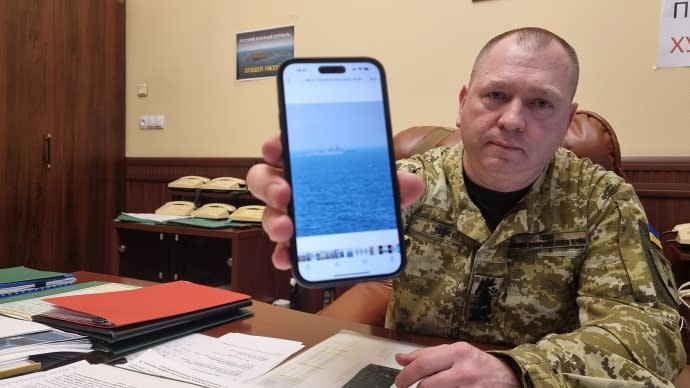
Were many border guards taken prisoner then? Have all of them been freed?
Around 80 of Ukraine’s defenders and civilians were taken prisoner then, including 28 border guards. As of now, 12 of them have been freed and 16 remain prisoners.
Unfortunately, we cannot affect these lists [of people to be swapped as part of Ukrainian-Russian prisoner exchanges – ed.] in any way. Russia gives back whoever it wants to give back. I can see no logic in its decisions. Some people have been held in Russian captivity since the first day of the war.
"We cannot abandon Bakhmut: it really is a fortress"
We can’t not ask you. During the first days, rank and file soldiers showed real courage. But at the same time, many people were fleeing the country. There were unexplained border crossings by, for example, men of conscription age with large amounts of cash and without appropriate documents. Have those cases led to any changes?
During the first days, we really did see large crowds of people at the border, mostly women and children, refugees fleeing the territory of Ukraine to escape the war.
As for those shameful incidents you described, with men trying to illegally cross the border – of course there were those incidents. There were also certain border guards…
We are members of society and there are heroes among us, but, sadly, there are also criminals. Everyone we, or other law enforcement agencies, were able to find – trust me, they are all subject to criminal proceedings.
During the very first day [of the full-scale invasion], I warned all of the personnel under my command: if anyone is caught [deserting], our conversation with them will be brief. No one will serve exclusively at the border, everyone will take part in hostilities.
I am not using deployment to the front to punish people. Defending your country is an honourable duty. But I want those who find themselves in more comfortable conditions to appreciate it. I want them to understand the conditions that the guys and girls who are risking their lives to defend our country on the front find themselves in.
Regarding the topic of men leaving the country...
I believe that we did the most important thing: we did not allow the understanding of the Ukrainian refugee abroad to change. Because the average Ukrainian refugee, as for today, is a woman with one or two children and elderly parents. I don't talk about such refugees like the Monaco battalion and all the rest.
But, for the sake of your understanding, 90 percent of all those who left – I have letters, they may have documents that they either have a disability or accompany a person with a disability. So they do have legal grounds [for leaving].
Every day, we do not let 50-70 people who were registered through Shliakh [the system of issuing permits to travel abroad for drivers, volunteers, etc. – ed.] leave.
Only the Ministry of Infrastructure and oblast military administrations permit [people] to leave, and various carriers can do it, too.
We have repeatedly detained people who paid money for being registered as truck drivers, while not even having a driver's licence of this category.
We examine them, interview them, and they say, "Yes, I paid 2,000 euros, so they had me registered". Of course, we hand these people over to the National Police of Ukraine.
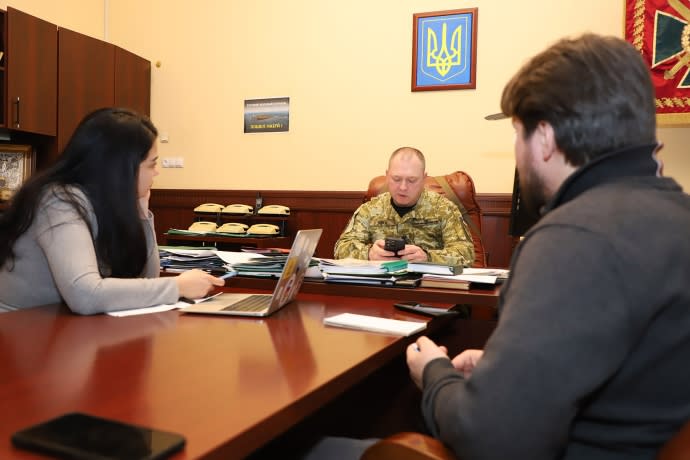
Recently, checkups have become stricter...
We just see there is an increase. I see how many people aged 18 to 60 leave per day. Yes, there is an increase, so that means we need to understand which documents and which grounds we need to examine. The system works.
We have a department of operational and investigative activities, we have our internal security divisions. But at the same time, some people think from time to time that they are smarter than others.
Unfortunately, we note that female servicemen understand that they will not go to war, and have been misusing this for some time. They thought that no one would find out. We did.
We know that you visit your units in different locations on the front line. Which part of the front line defended by border guards is the toughest spot?
Fortress Bakhmut, no exaggeration. The situation is the hottest and the guys there do everything possible to hold those positions. Every day, they kill Russian soldiers and officers who are trying to capture Bakhmut and then achieve the administrative borders of Donetsk Oblast.
But you can't leave Bakhmut either. You can't, because it is a real fortress. Our heroes kill these Wagner Group soldiers, the regular Russian army, every day there.
Do you understand the Russians' morale? This war is sacred for us, but it is something completely incomprehensible for them. It is possible to try to "get rid of the Nazism and the threat of NATO" after listening to Russian television. But you must understand that there are not many such people who believe propaganda.
Now, unfortunately, the Russians come here to kill for money. It is no longer something immoral for them. Therefore, many people go to war to solve their financial problems, to pay off loans... And that decision to involve prisoners from the Wagner PMC, excuse me, what is it anyway?
Our boys are very combative. Two weeks ago, a unit of the Luhansk border detachment shot down 2 Russian Su-25 planes in 5 days.
Has anyone thought before the start of the full-scale aggression that the border guards would take prisoners, that they would shoot down aircrafts, that they would fire mortars? And now our mortar crews work very well, no worse than those of Ukraine’s Armed Forces.
But formally you do not belong to the Armed Forces...
...we are under operational subordination.
And so there is the question of ensuring how you get paid, for example, how different is your salary from the one received by the Armed Forces?
We have our own budget. But all payments must be identical to the Armed Forces' financial support, especially in the combat areas. If something happens in a different way, it should already be on the conscience of those commanders who allow illegal payments, for example.
What about ammunition? For example, there is a big difference in support between the Ukrainian Armed Forces and the Russian Armed Forces, even if they are fighting on the same front. Which situation do the border guards have?
Of course, the Armed Forces definitely have better provision, because they are the main beneficiary of receiving international technical assistance, as it goes mainly through the Defence Ministry. But we make the appropriate requests, and our units are supplied with the stuff we ask for.
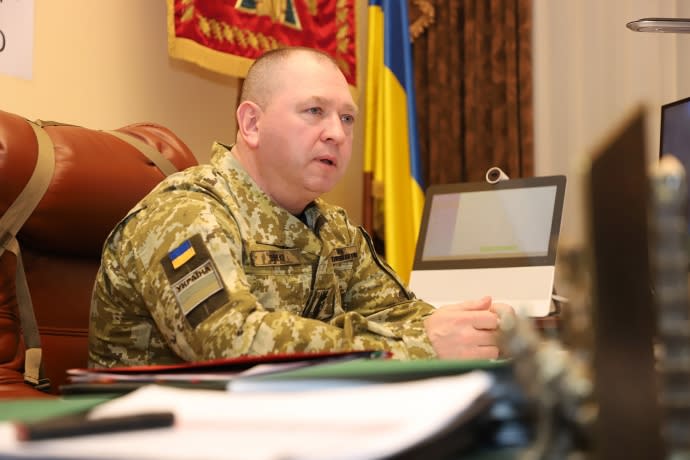
What is the greatest need now? Maybe we can voice it.
The greatest need of our state is for him to die [points with his hand to the poster saying "Putin – d***head" – ed.]. I think it will solve all our problems. We wouldn't need mines, shells, or quadcopters.
But yes, there is always a need, because when you have the opportunity, say, to use 10 mines, you always want to have 15 of them. Because every Russian must become a "good Russian" [i.e. to die]. And the more opportunities we have, the more effectively we will use them.
Or the drones – unfortunately, there are days when we lose two or three. Their electronic warfare operates very actively. They also lose some, we shoot them down. But no drone is more expensive than a soldier's life. It protects their lives. So I'm ready to lose all drones in order to save one life.
Finally, we wanted to ask you something. You surely have a story of hope. Can you tell us? How not to go crazy, if we can say so?
No, everything is absolutely okay. You know, you don’t go crazy. You just have to learn to appreciate what you have. I have such an ideology, I look for the bright side in everything. For example, a person is walking, then slips, falls and breaks their arm. It's good, because he/she had the opportunity to break one's neck. And here is just the arm, it will recover.
That's why I'm always positive. I do not use any stimulation pills, no sedatives. I must always feel the full impression.
You just can't feel sorry for yourself. And if someone says that he is not afraid, don't believe it, everyone is afraid. We were in Bakhmut. Terrible? Terrible. There are strikes. But you are a commander, you have no right to show your fear.
It's scarier to be here and listen to these reports about the boys that are there [at the front line – ed.], but you can’t help them in any way. I'm better off there, I don't want to go back. It's all mine. That's why I rush there for at least two days. Just to see the boys, and that sparkle in their eyes.
You once worked in the Luhansk [border guard] detachment, you have a lot of things that connect you with Luhansk. When will we return to Luhansk? Do you have your own prediction?
Last year, about October, I predicted that we would win this year, in October-November, no later. I haven’t changed my mind yet.
Sevgil Musaieva, Roman Romaniuk, Ukrainska Pravda
Translated by Anton Strii, Olya Loza and Tetiana Buchkovska
Edited by Ivan Zhezhera

